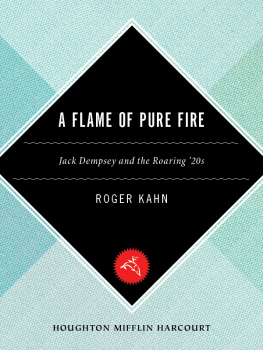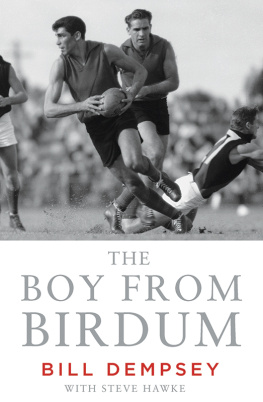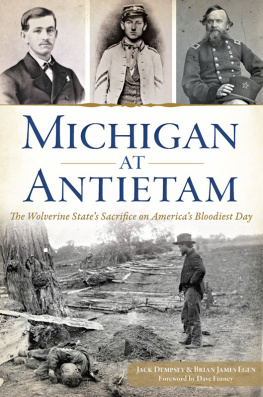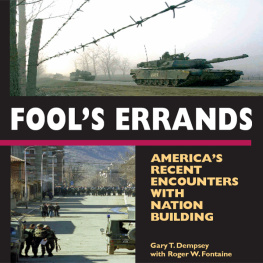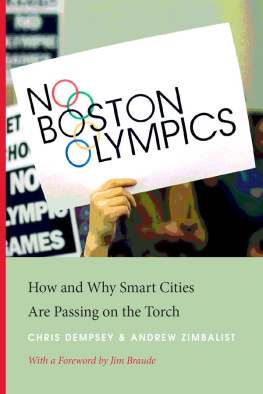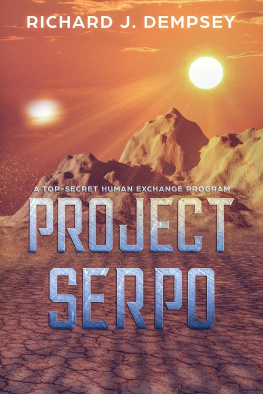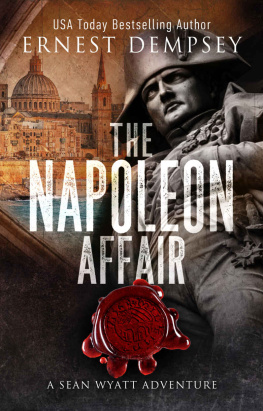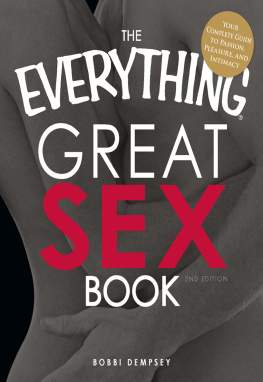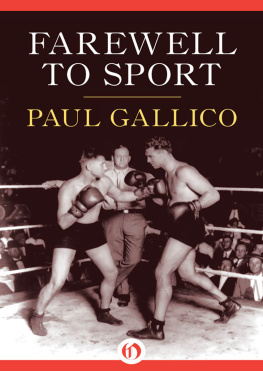Copyright 1999 by Hook Slide, Inc.
All rights reserved. No part of this publication may be reproduced or transmitted in any form or by any means, electronic or mechanical, including photocopy, recording or any information storage and retrieval system, without permission from the publisher.
For information about permission to reproduce selections from this book, write to Permissions, Houghton Mifflin Harcourt Publishing Company, 215 Park Avenue South, New York, New York 10003.
www.hmhbooks.com
Jack Dempsey obituary on by Jim Murray.
Copyright 1983, Los Angeles Times. Reprinted by permission.
The Library of Congress has cataloged the print edition as follows:
Kahn, Roger.
A flame of pure fire: Jack Dempsey and the roaring 20s/
Roger Kahn.1st ed.
p. cm.
Includes bibliographical references.
ISBN 0-15-100296-7
ISBN 0-15-601414-9 (pbk.)
1. Dempsey, Jack, 18951983. 2. Boxers (Sports)United States
Biography. I. Title.
GV1132.D4K35 1999
796.83'092dc21 99-15382
[B]
eISBN 978-0-547-72583-3
v2.0313
To Katy, the newest fight fan,
and to the memory of the champion who
won her over
Whenever I hear the name, Jack Dempsey, I think of an America that was one big roaring camp of miners, drifters, bunkhouse hands, con men, hard cases, men who lived by their fists and their shooting irons and by the cards they drew. America at High Noon.
J IM M URRAY
The public suddenly saw him in a new light, the two-handedfighter who stormed forward, a flame of pure fire in the ring, strong, native, affable, easy of speech, close to the people in word and deed and feeling.
J OHN L ARDNER
Prologue
On a blustery April afternoon in 1960, with much of the country wondering what would happen when Ingemar Johansson, the last white man to hold the heavyweight championship, gave brooding Floyd Patterson the chance to win it back, I walked into Jack Dempseys Restaurant on Broadway for some expert opinion. Dempsey himself had not been heavyweight champion for thirty-three years but people everywhere continued to call him Champ. Scores, hundreds, of great boxing figures have swaggered and staggered across the century. Uniquely, and I believe deservedly, William Harrison Dempseypart Scots, part Irish, part Cherokee, and part Jewishwas our one eternal champ.
More than any other individual, Jack Dempsey created big-time sports in America. The time frame here ran roughly from 1919, when Prohibition began, until 1929, when the stock market crashed and the era of wonderful nonsense came to a shattering conclusion. A tumult of our current issuesfrom racism to heroin, from new journalism to casual sexboiled and bubbled through the Dempsey days. Surely he helped make the times what they were, but, in the complexity that is a full-framed hero, Dempsey himself was shaped by the times that he created. Urgent, restless, roistering are words that come to mind.
When Dempsey won the championship on July 4,1919, his fight with mountainous Jess Willard drew 19,650 fans. Dempseys purse was $27,500. For his final championship fight, on September 22,1927, the crowd numbered 104,943 and Dempsey and Gene Tunney split $1,540,445. Sports, and indeed being an athlete, had become big business. Dempsey was more prominent than any of his great sporting contemporariesBill Tilden, Red Grange, Bobby Jones, Babe Ruth. I knew some of these things on that April afternoon in 1960 when I walked out of the wind and into his Broadway saloon.
It was 3:30, the last lunch customer had left, and Dempsey greeted me with an easy smile and motioned for me to join him in a booth. At sixty-four, he still had blue-black hair. His eyes were dark, over high cheekbones and under thick, arched, intimidating eyebrows. As we talkedhis voice was a tenors, even a little squeakythe sense of intimidation disappeared. He considered me kindly, listened hard to what I had to say. I began to feel that this towering figure, whom I had been visiting from time to time for about five years, was an old and very close friend. Dempsey had this effect on many men and also on many women.
How would you handle Johansson? he said at length.
I had seen Johansson win the championship by knocking Patterson senseless with a monstrous right-hand punch that landed between the eyes. Patterson went over backward very hard. Then he got up and walked across the ring, clutching his nose, like a child who doesnt want to fight anymore. Johansson knocked Patterson down six more times before the referee stopped it.
Youve got to watch the big right hand, I said, so Id crowd him. Keep moving in close so he has no room to throw the right. Work on his body for a few rounds.
Pal, Dempsey said, I can see you know your boxing.
Thanks, Champ.
Now I want you to get up. Well take off our jackets. Then show me how youd crowd the Swede. Dempsey gestured and a few busboys moved back tables, creating an open space, an informal boxing ring, in the center of the restaurant.
Ive done it now, I thought. First I tell Jack Dempsey how to fight. Now Ive got to spar with him. But hes always been a genial sort, at least to me. After all these years, hes probably harmless.
I want you to crowd me, Dempsey said, and then Im going to show you my old one-two. I looked at him. Quite suddenly, Dempsey was considering me with no geniality at all. His eyes were pitiless. It was as if he neither knew me nor cared who I was. The knuckles on his fists looked like an eagles talons.
As ordered, I moved in. The fastest left-hand punch I ever saw up close creased the right side of my face, etching a line along the jawbone. A right I never saw cracked into my midsection.
I spun back and lowered my hands.
Dempsey drove an even harder left along my jaw. One-two, I said. One-two. Thats three.
Keep your guard up at all times, Dempsey said, in a cold, flat tone.
Then it was over. He put his own hands down. The menace fled from his face. He patted my back. Pal, you deserve a drink. This is my place, so Ill be buying.
For the next three hours, until the dinner customers came in, Dempsey told me stories from the saga, the epic poem, of his life. The family left West Virginia for Colorado in the 1880s because there was supposed to be work there in the mines. As the dreams of riches died in the high country, Celia Dempsey converted to the Mormon church. Her son described himself as a Jack-Mormon, a Mormon who had left the faith.
He decided he wanted to be heavyweight champion when he was eleven years old. After grade school, he found work in the mines and rounding up cattle. I was a miner and I was a cowboy, he said, but mostly I was a hobo. I fought wherever I could, in school halls, outside saloons, anyplace they were putting up a purse. I once walked thirty miles across the desert to a town called Goldfield in Nevada so I could fight for twenty dollars. I got beat a lot. I improved. But I remember the beatings I took. Once I got beat so bad they had to take me out of the ring in a wheelbarrow.
Later some said I was a killer in the ring. They got that wrong. I killed nobody. But I took out other guys quick. That much is true. I got more one-round knockouts than anybody, sixty knockouts in the first round. I beat a good heavyweight in New Orleans once in fourteen seconds. I knocked out Fred Fulton, six-foot-four, 250 pounds, in nineteen seconds. How come? Not because I was a killer. Other way round. I was always afraid that Id be the one who was killed. Get em quick and you live to fight another day.
After a while, Dempsey turned contemplative. I had great writers covering me. Ring Lardner. Grantland Rice. Heywood Broun. I was lucky they came along the same time I did. I got to star in three movies and in a regular serial they showed the kids on Saturday afternoons.
Next page
